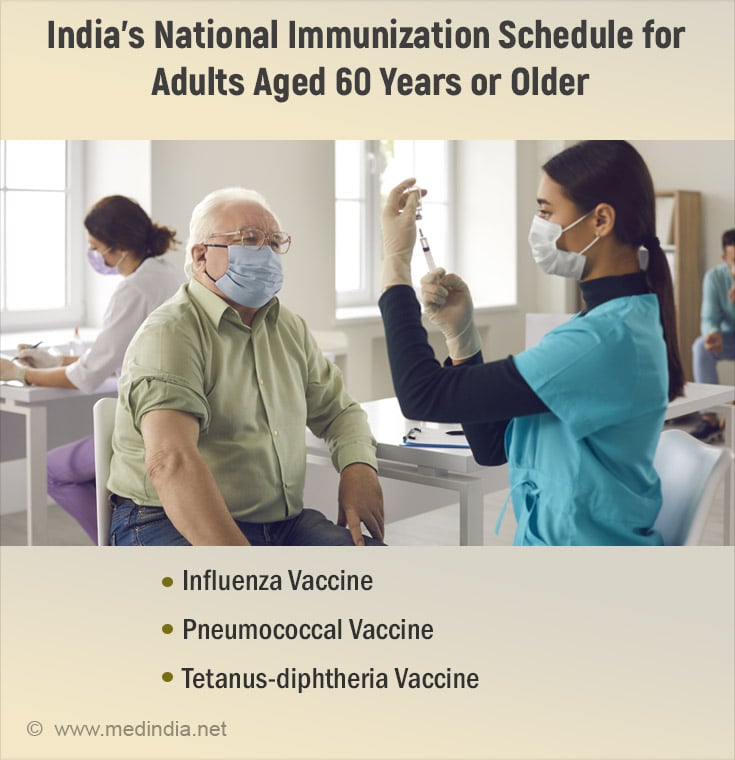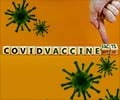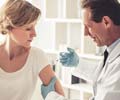- Efficacy and Safety of Vaccinations in Geriatric Patients: A Literature Review - (https://pubmed.ncbi.nlm.nih.gov/37766089/)
- Do influenza and pneumococcal vaccines prevent community-acquired respiratory infections among older people with diabetes and does this vary by chronic kidney disease? A cohort study using electronic health records - (https://drc.bmj.com/content/5/1/e000332)
- Vaccinations in Older Adults - (https://pubmed.ncbi.nlm.nih.gov/29129213/)
- Guidelines for vaccination in normal adults in India - (https://www.ncbi.nlm.nih.gov/pmc/articles/PMC4928530/)
About
As we age, our immune system weakens, making us more vulnerable to infectious diseases. For grandparents, staying healthy means not only safeguarding their well-being but also protecting the health of their grandchildren and other loved ones. Vaccination plays a crucial role in achieving this goal, providing essential protection against a range of preventable illnesses. Let's understand the importance of vaccines for older adults and discuss the key vaccines recommended for grandparents.
What are Geriatric Vaccines?
Geriatric vaccines, also known as senior or adult vaccines, are immunizations specifically designed to protect older adults against infectious diseases. As individuals age, their immune system naturally weakens, making them more susceptible to infections and less responsive to vaccines they received earlier in life(1✔ ✔Trusted Source
Efficacy and Safety of Vaccinations in Geriatric Patients: A Literature Review
Go to source). Geriatric vaccines are tailored to address these age-related changes in immunity and provide older adults with essential protection against preventable illnesses.
Why Vaccines Matter for Older Adults
Vaccines are not just for children; they are equally important for older adults. As we age, our immune system changes, becoming less effective at fighting off infections. This makes older adults more susceptible to certain diseases, such as influenza, pneumonia, and shingles.
Did You Know?
Senior citizens should get vaccinated not only to protect themselves but also to contribute to the concept of 'herd immunity', safeguarding the entire community from contagious diseases!These vaccines are important for maintaining health and well-being in later years, as older adults are at increased risk of serious complications and hospitalization from these vaccine-preventable diseases. Geriatric vaccines work by stimulating the immune system to produce antibodies that recognize and neutralize specific pathogens, helping to prevent infection or reduce the severity of illness if infection does occur. By receiving recommended vaccines, older adults can not only protect themselves but also contribute to the overall health of their families and communities by reducing the spread of infectious diseases.
Importance of Vaccination in Elderly
For older adults, vaccination offers several important benefits:
Protecting Personal Health:
By getting vaccinated, grandparents can reduce their risk of contracting serious diseases and experiencing severe complications. Vaccines such as the flu shot and pneumococcal vaccine help prevent respiratory infections and other illnesses that can lead to hospitalization or even death(2✔ ✔Trusted SourceDo influenza and pneumococcal vaccines prevent community-acquired respiratory infections among older people with diabetes and does this vary by chronic kidney disease? A cohort study using electronic health records
Go to source).
Preventing Transmission:
Vaccination not only protects individuals but also helps prevent the spread of disease to others. Grandparents who are vaccinated are less likely to transmit infections to their grandchildren and other family members, especially those who may be too young to be fully vaccinated or have compromised immune systems.Setting an Example:
By prioritizing vaccination, grandparents can set a positive example for their family members and encourage others to prioritize their health. This can help promote a culture of immunization within the family and community.Vaccine List for Elderly People
For older adults, receiving recommended vaccinations is crucial for maintaining optimal health and preventing serious illnesses. The following vaccines are recommended for older adults(3✔ ✔Trusted Source
Vaccinations in Older Adults
Go to source):
Influenza Vaccine:
The influenza vaccine, commonly known as the flu shot, is a yearly immunization that protects against seasonal influenza viruses. Older adults are particularly vulnerable to complications from the flu, including pneumonia and exacerbation of underlying health conditions. By getting vaccinated annually, seniors can significantly reduce their risk of flu-related hospitalization and mortality.Pneumococcal Vaccine:
Pneumococcal vaccines protect against infections caused by the bacterium Streptococcus pneumoniae, which can lead to pneumonia, meningitis, and bloodstream infections. There are two types of pneumococcal vaccines recommended for older adults: the pneumococcal conjugate vaccine (PCV13) and the pneumococcal polysaccharide vaccine (PPSV23). These vaccines are especially important for seniors with chronic medical conditions or weakened immune systems.Herpes Zoster Vaccine:
The herpes zoster vaccine, also known as the shingles vaccine, helps prevent shingles, a painful rash caused by the varicella-zoster virus. Shingles can be debilitating for older adults, leading to chronic pain and complications such as postherpetic neuralgia. The vaccine is recommended for individuals aged 50 and older, even if they have previously had shingles.
Tetanus, Diphtheria, Pertussis Vaccine:
The Tdap vaccine protects against tetanus, diphtheria, and pertussis (whooping cough). Tetanus, also known as lockjaw, is a serious bacterial infection that can cause muscle stiffness and spasms. Diphtheria is a contagious respiratory disease that can lead to breathing difficulties and heart problems. Pertussis is a highly contagious respiratory infection that can be severe, particularly in older adults.Hepatitis B Vaccine:
The hepatitis B vaccine is recommended for older adults who are at increased risk of hepatitis B infection due to factors such as healthcare work, travel to endemic regions, or certain medical conditions. Hepatitis B is a viral infection that affects the liver and can lead to chronic liver disease, liver cancer, and other serious complications. Vaccination is an effective way to prevent hepatitis B transmission and protect liver health in older adults.Indian Guidelines for Vaccination in Older Adults
In India, the Ministry of Health and Family Welfare provides guidelines for vaccination in older adults(4✔ ✔Trusted Source
Guidelines for vaccination in normal adults in India
Go to source). The National Immunization Schedule includes recommendations for vaccines such as influenza, pneumococcal, and tetanus-diphtheria vaccines for individuals aged 60 years and older.
Additionally, the Indian Council of Medical Research (ICMR) collaborates with the Ministry of Health and Family Welfare to develop comprehensive vaccination guidelines tailored to the unique healthcare needs of older adults in India. These guidelines are designed to address the specific epidemiological and demographic factors influencing vaccine-preventable diseases in the country's aging population.
The National Technical Advisory Group on Immunization (NTAGI) plays a pivotal role in formulating vaccination policies and guidelines for older adults, ensuring alignment with international standards and best practices. NTAGI regularly reviews scientific evidence and epidemiological data to make informed recommendations regarding vaccine inclusion, scheduling, and administration in the elderly population.
In addition to routine vaccinations recommended for all adults, such as influenza and pneumococcal vaccines, the Indian guidelines may also emphasize the importance of vaccines against diseases prevalent in the region, such as hepatitis B and typhoid fever. The guidelines prioritize vaccines based on disease burden, vaccine efficacy, safety profile, and cost-effectiveness to optimize public health outcomes.
Furthermore, the Ministry of Health and Family Welfare collaborates with state health departments and healthcare providers to implement vaccination programs targeting older adults. These programs often involve outreach initiatives, vaccination drives, and public awareness campaigns to ensure equitable access to vaccines and promote vaccination uptake among elderly individuals across diverse socio-economic backgrounds.
Overall, adherence to Indian guidelines for vaccination in older adults is essential for reducing the burden of vaccine-preventable diseases, enhancing the health and well-being of the elderly population, and achieving national public health objectives related to immunization coverage and disease control.











